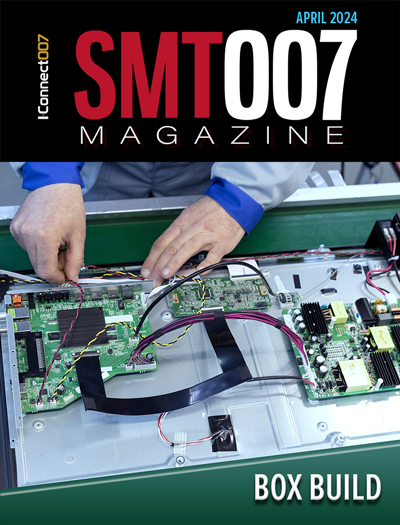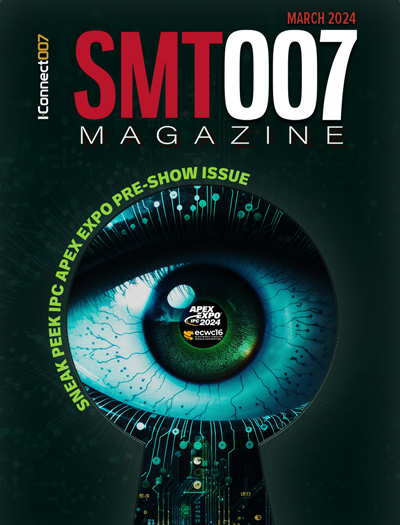-

- News
- Books
Featured Books
- smt007 Magazine
Latest Issues
Current Issue
Box Build
One trend is to add box build and final assembly to your product offering. In this issue, we explore the opportunities and risks of adding system assembly to your service portfolio.

IPC APEX EXPO 2024 Pre-show
This month’s issue devotes its pages to a comprehensive preview of the IPC APEX EXPO 2024 event. Whether your role is technical or business, if you're new-to-the-industry or seasoned veteran, you'll find value throughout this program.

Boost Your Sales
Every part of your business can be evaluated as a process, including your sales funnel. Optimizing your selling process requires a coordinated effort between marketing and sales. In this issue, industry experts in marketing and sales offer their best advice on how to boost your sales efforts.
- Articles
- Columns
Search Console
- Links
- Events
||| MENU - smt007 Magazine
Knowledge: At the Heart of Great Customer Service
May 26, 2023 | Barry Matties, I-Connect007Estimated reading time: 1 minute
David Thomas, master IPC trainer at EPTAC, says that the more you understand the work and technology that go into your processes and products, the better you can serve your customers. That includes knowing the basics.
Barry Matties: There are a lot of approaches to customer service, but I’m a firm believer that content knowledge is the foundation of great customer service. Service is a process, but understanding technology certainly is a benefit. What are your thoughts on that?
David Thomas: There are cases that I’ve personally experienced in which someone knows how to speak the language, but they don’t know how to apply it, and vice versa. They may come in and talk about something. They think they’re speaking as an educated person but are saying something completely wrong. For example, they need to know the basics, from the difference between a resistor and a diode, to how a resistor pack, timer, and an EPROM operate. If you go to a conference or talk with a customer, you need to have basic knowledge so that you’re on the same page as them. They should be able to see that you’re not the person putting the solder to the application.
Matties: What advice would you give someone who’s looking to retool their customer service department or their approach to customer service?
Thomas: First, gain knowledge on the things you’re working with. You can often gain a good understanding by taking, for example, a basic soldering class. Even if you don’t use that knowledge, at least you have it. You were there, you did it, and you saw what it takes to do it. You have a better understanding. I find that many engineers who are at the design level want something done to a certain degree, but they have no idea what they’re asking for. It makes no sense at all because they aren’t there, trying to put it together. Customer service improves when people speak the same language and have a good understanding, whether it’s the engineer and whoever is doing the work, or a customer and a company.
Matties: David, thank you so much.
Thomas: Thank you.
This article originally appeared in the May 2023 issue of PCB007 Magazine.
Suggested Items
Taiyo Circuit Automation Installs New DP3500 into Fuba Printed Circuits, Tunisia
04/25/2024 | Taiyo Circuit AutomationTaiyo Circuit Automation is proud to be partnered with Fuba Printed Circuits, Tunisia part of the OneTech Group of companies, a leading printed circuit board manufacturer based out of Bizerte, Tunisia, on their first installation of Taiyo Circuit Automation DP3500 coater.
Vicor Power Orders Hentec Industries/RPS Automation Pulsar Solderability Testing System
04/24/2024 | Hentec Industries/RPS AutomationHentec Industries/RPS Automation, a leading manufacturer of selective soldering, lead tinning and solderability test equipment, is pleased to announce that Vicor Power has finalized the purchase of a Pulsar solderability testing system.
AIM Solder’s Dillon Zhu to Present on Ultraminiature Soldering at SMTA China East
04/22/2024 | AIMAIM Solder, a leading global manufacturer of solder assembly materials for the electronics industry, is pleased to announce that Dillon Zhu will present on the topic: Ultraminiature Soldering: Techniques, Technologies, and Standards at SMTA China East. This event is being held at the Shanghai World Expo Exhibition & Convention Center from April 24-25.
AIM to Highlight NC259FPA Ultrafine No Clean Solder Paste at SMTA Wisconsin Expo & Tech Forum
04/18/2024 | AIMAIM Solder, a leading global manufacturer of solder assembly materials for the electronics industry, is pleased to announce its participation in the upcoming SMTA Wisconsin Expo & Tech Forum taking place on May 7 at the Four Points by Sheraton | Milwaukee Airport, in Milwaukee, Wisconsin.
Hentec/RPS Publishes an Essential Guide to Selective Soldering Processing Tech Paper
04/17/2024 | Hentec Industries/RPS AutomationHentec Industries/RPS Automation, a leading manufacturer of selective soldering, lead tinning and solderability test equipment, announces that it has published a technical paper describing the critical process parameters that need to be optimized to ensure optimal results and guarantee the utmost in end-product quality.


